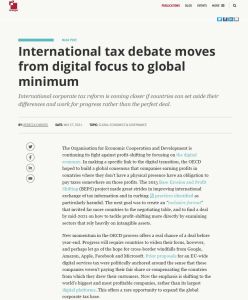Join getAbstract to access the summary!

Join getAbstract to access the summary!
Rebecca Christie
International tax debate moves from digital focus to global minimum
International corporate tax reform is coming closer if countries can set aside their differences and work for progress rather than the perfect deal.
Bruegel, 2021
What's inside?
Collaborative efforts on global corporate taxation focus more on progress than perfection.
Recommendation
Achieving broad global agreement on corporate taxation hasn’t been easy. National priorities and political rigidities stymie the ability to reach common ground, but recent reports that the G7 countries have agreed to a 15% minimum global tax rate indicate that progress is possible. In this insightful analysis, issued just days before the G7 announcement, policy expert Rebecca Christie offers business professionals some important highlights of the OECD’s tax plan.
Summary
About the Author
Rebecca Christie is a nonresident fellow at Bruegel.

















Comment on this summary